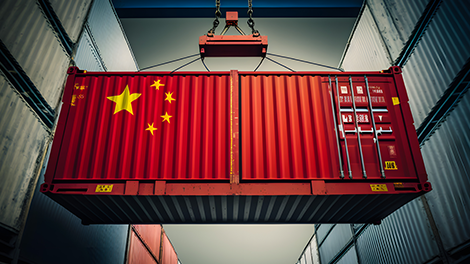The US Election has defied the polls and declared Donald Trump as its resounding winner. He beat Kamala Harris, having achieved 294 electoral college votes at the time of writing, comfortably more than the 270 required. It means Trump will become only the second president ever, after Grover Cleveland, to serve two separate terms.
“I want to thank the American people for the extraordinary honour of being elected your 47th president and your 45th president… America has given us an unprecedented and powerful mandate.”
Donald Trump, United States president-elect
It’s a result which has impacts for logistics, trade and the global economy. Trump was very outspoken on tariffs in the election campaign. Those involved in international trade await key policy announcements.
Here we will explore what Donald Trump's election victory could mean for those involved in logistics and international trade.
We will likely see additional tariffs on imports and other protectionist measures
The biggest potential disruption to trade and logistics comes in the form of heavily trailed aggressive tariffs on imports. Trump has been very clear about a protectionist agenda for the US. Pushing to see far more manufacturing and production in the country.
Now we don’t have any specific policy at this extremely early stage, but we can hypothesise based on comments in the election campaign.
Trump has suggested that all imports would be taxed at 10%. Now, if the world’s leading economy, with a GDP of $27.36 trillion and a final consumption expenditure of over $21 trillion implements such tariffs, it will impact international trade significantly.
This would likely hit the global logistics sector in the form of lowering demand for containerised trade, including Asian and European exports to the USA.
Any tariffs are inflationary, increasing production costs for companies, and dampening consumer demand.
The theory here, of course, is to make US goods more competitive and comparatively cheaper, which will boost domestic demand for them. It’s no secret that some parts of the US have been severely impacted by the closure of factories and movement of manufacture offshore. Trump and the American people clearly want to address that.
It’s also worth noting that the Trump tariffs implemented during his first term, have been upheld by the Biden Administration. The feeling of protectionism is undoubtedly cross-party.
Huge tariffs specifically targeted at China, potentially driving reshoring
Another signature policy during the election campaign has been a muted 60% tariff on imports from China. Now if implemented, this could likely cause a restructuring of global supply chains away from the Asian nation.
Such tariffs would make sourcing goods from China extremely uncompetitive compared to its neighbours.
It would certainly cause a huge reduction in volumes and demand on China to US trading routes. A route which accounted for 38.8% of the total U.S. container imports in June 2024.
“We’ve seen a lot of talk about the China Plus One supply chain strategy in recent years. Where companies source products from another nation, alongside China, to improve their resilience.
Now those who rolled out that strategy would be at a significant advantage when reshoring their supply chain, if these 60% tariffs on Chinese imports are implemented.”
Rochelle Sommer, Co-CEO, WTA Group
There is a scenario where such aggressive tariffs on China specifically, USA’s trade with Europe is boosted as tariffs from European partners are comparatively far less dramatic. An outcome many in the EU and UK will be hoping for.

Assessing China's position as the world's import hub
After the US Election result, have a read of our whitepaper from 2023, assessing whether China will continue as a hub for sourcing goods.
Environmental legislation to be rolled back
During Donald Trump’s first term as president, he rolled back hundreds of environmental protections, such as limits on carbon dioxide emissions from vehicles. During this campaign he promised to reverse Biden’s efforts to supercharge investment in green technology.
Trump also hinted that he wanted to push for the drilling of more oil. Coupling this with deregulation on environmental goals and the short-term impact here would be a reduction in costs related to transportation. It would also therefore reduce the inflationary pressure of other tax measures.
So a win for reducing business cost. In the short term at least.
However, the costs associated with moving towards net-zero are necessary according to overwhelming scientific consensus. Whilst rolling back environmental legislation might be a short-term win on costs for logistics and trade, it’s widely accepted that reducing emissions is vital for stability of the planet in the long term.
Potentially sizable growth for the US road freight sector
Combining the factors discussed so far, we can conclude that the big winners from this election could be the US road freight sector. Policies geared towards ramping up domestic manufacture and oil production, at the expense of international trade, will be extremely positive for road haulage in the USA.
The only threat to this comes in the form of subdued economic growth. Which is a potential consequence of the aggressive tariff programme. If the US consumer is hit too hard by inflation and increased goods prices, then its unlikely the road freight sector will be such a winner.
The full ramifications of Donald Trump’s electoral victory will remain unknown for the coming months at least. However, the next 5 years are set to have a profound impact on international trade, if a lot of his campaign policy suggestions play out.
In these uncertain times, your logistics must be backed up by the best experts in the field and the latest technology. At WTA, we have both. For guidance on building resilience into your logistics for the years ahead, get in touch.







